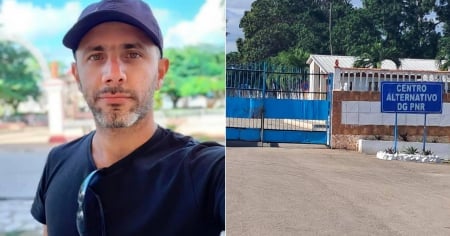Cuba is sinking into misery, and President Miguel Díaz-Canel remains clinging to a reality that doesn't exist on the streets and to a future that everyone, except him, sees as uncertain in a country ravaged, like never before, by poverty and scarcity. Amid the year-end blackouts, Raúl Castro's successor can think of nothing better than to assure that a "prosperous" 2025 is on its way.
He did so during his intervention via videoconference at the meeting of the Eurasian Economic Supreme Council, which is taking place in Saint Petersburg (Russia), where Cuba is participating as an observer country.
"We are an optimistic, resilient, and creative people, and we are confident that 2025 will be 'beneficial' despite the challenges in achieving common objectives and goals for sustainable development," he stated at the end of a nearly five-minute speech in which, as usual, he blamed all the ills of the Island on adverse weather phenomena and a supposed intensification of the U.S. embargo, conveniently ignoring that it is well known that the Biden Administration eased the measures and sanctions imposed on the Cuban communists during President Donald Trump's first term.
In fact, as soon as he arrived at the White House, the Democrat approved, in May 2022, the lifting of restrictions on travel, the sending of remittances, and flights to the Island. Nevertheless, Díaz-Canel propagates the narrative that conditions have worsened under Biden compared to Trump. As usual, he did not mention, even indirectly, his poor management and the failure of the Tarea Ordenamiento, which his government acknowledged but has since failed to revisit, perhaps hoping that this significant mistake will be forgotten.
In the nearly five minutes of his online intervention, the Cuban leader expressed hope that the Fourth Joint Commission between Cuba and the Eurasian Economic Commission, scheduled to take place in the first quarter of 2025 in Russia, will help "achieve concrete results for everyone."
Díaz-Canel has said little to nothing in his speech, beyond the well-worn emphasis on "cooperation, solidarity, and integration." However, he did express his loyalty to Putin, the host of the meeting. "Rest assured that you can count on the modest and committed support of Cuba, in its capacity as an Observer State," he stated.
Uncomfortable while reading from the teleprompter, Díaz-Canel did not explain in his speech why he did not personally attend the Euro-Asian Economic Summit, which celebrated its tenth anniversary this year. He himself claims it is an "important mechanism for economic integration," aimed at developing "mutually beneficial cooperation" among the member countries (Armenia, Belarus, Kazakhstan, Kyrgyzstan, and Russia) and the observers (Cuba being one of them).
It is worth noting that at the end of September and the beginning of October this year, a large Cuban delegation attended the Third Eurasian Economic Forum held in Armenia, and in less than three months there will be another meeting in Russia.
This time, they have gathered on the outskirts of Saint Petersburg, amid ongoing tensions between the current president of Armenia and his successor, Belarus, who will take over in 2025. To add fuel to the fire, the Belarusian leader Alexandr Lukashenko has proposed that the next meeting be held in Minsk. He does this because it is customary to alternate summits between Russia and the country presiding over the Eurasian Economic Union, but also to put the Armenian president Nikol Pashinyan in a difficult position, as he publicly stated that he would not set foot in Belarus while Lukashenko was in power.
Responses to Díaz-Canel's speech quickly emerged on the social media platform X (formerly Twitter), where users urged him to prioritize the Cuban healthcare system over solidarity and encouraged him to recognize that the world has changed and that slogans have not been relevant for years.
This is not the first time Díaz-Canel has delivered an optimistic speech. Recently, he stated that despite the difficulties, "the country is advancing and growing." He has also blamed the United States for the shortcomings and challenges of the Cuban healthcare system, ignoring that his government allocates 14 times more budget to tourism than to hospitals.
Filed under:
